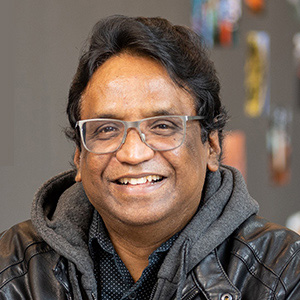Speakers

Prof. Ramaswami Mahalingam
Psychology Professor,
Personality and Social Contexts program, University of Michigan
Ramaswami (Ram) Mahalingam is a cultural psychologist, award-winning researcher, teacher, mentor, artist, and filmmaker (www.mindfuldignity.com). He developed a holistic mindfulness perspective, the Banyan Tree Mindset, with seven features to sustain our vision for three kinds of dignity (personal, intersubjective, and processual). His holistic mindfulness is an all-encompassing approach that spans multiple dimensions of our lives - mental, physical, emotional, and social with a particular emphasis on the need to recognize the dignity of our fellow human beings, especially those who are vital to our well-being yet invisible and ignored (e.g., Janitors). His current research focuses on promoting a caring and compassionate workplace that treats its workers with dignity. Ram is dedicated to developing leaders who prioritize dignity and contribute to workplace well-being. His current research explores dignity within four organizational contexts: (a) Janitors and cleaning; (b) Dignity in Healthcare settings; (c) Dignity, Gender, and Technology; and (d) Dignity injuries experienced by crematorium workers in India. He serves as Director of the Barger Leadership Institute and the Barger Leadership Institute Professor in the Personality and Social Contexts program at the University of Michigan. Additionally, he has edited two books: Multicultural Curriculum (Routledge) with Cameron McCarthy and Cultural Psychology of Immigrants (Lawrence Erlbaum). He developed an online Coursera course, Mindfulness, Dignity, and the Art of Human Connection (https://myumi.ch/qVQ7N).
Plenary Keynote Address (3) - Social justice and equality
Mindfulness is conceived in many ways. Some conceptions of mindfulness focus on the esoteric aspects of gaining mystical or spiritual powers. On the other hand, mainstream mindfulness focuses on the individual's growth—it’s often seen as a self-enhancement tool. Mindfulness is often viewed as a self-enhancement tool to improve attention, physical health, mental health, and emotional well-being. However, from the Buddhist and Eastern perspectives, mindfulness is about something more profound and of a deeper significance. It's about realizing interconnectedness and understanding that my well-being is intrinsically linked to the contributions of many people. This understanding is a powerful tool for building peace and dignity in our communities, as it encourages us to recognize and appreciate the contributions of others. Mindfulness practices play a crucial role in helping us to recognize the dignity of other human beings. Mindful awareness is our capacity to be in the present and recognize the humanity of people around us, which will deepen our connection with our communities. So, mindfulness is not just about how long you can meditate, which is essential. But can you treat the other person with dignity? And treat yourself with dignity and treat Mother Nature with dignity? For me, recognizing the dignity of self and others becomes our litmus test of the everyday practice of mindfulness. With seven features, I developed a holistic mindfulness perspective, Banyan Tree Mindset (https://myumi.ch/qVQ7N). My presentation will focus on the Banyan Tree Mindset and three kinds of dignity to build an equitable and interconnected community, fostering peace, harmony.
back